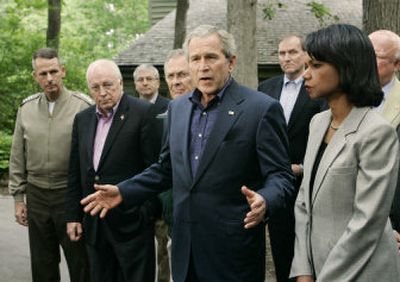Iraq strategy session begins

CAMP DAVID, Md. – President Bush reassured Iraqis on Monday that the United States stands ready to help their new government, but said success in Iraq largely depends on Baghdad’s ability to secure the nation and care for its citizens.
Beginning a two-day strategy session on Iraq at Camp David, Bush also said Iraq’s neighbors should be doing more to help. He said the United States expects countries that have promised $13 billion in financial assistance to make good on their pledges.
Bush’s huddle with top advisers was a chance to outline ways the U.S. government can best help Iraq, where the power runs sporadically and Iraqi civilian and U.S. troop deaths are mounting. White House advisers said the U.S. mission in Iraq was at a breakpoint, rhetoric that suggests the administration is anxious to shift responsibility for the future of Iraq to the Iraqis.
“The best way to win this war against an insurgency is to stand up a unity government which is capable of defending itself, but also providing tangible benefits to the people,” Bush said, standing outside a cabin at the secluded, wooded presidential retreat with his national security team and members of his Cabinet.
“Ultimately, the Iraqi people are going to have to make up their mind. Do they want to live in terror, or do they want to live in peace?” he said.
Now in its fourth year, the war also was an issue Monday on Capitol Hill.
The Senate opened debate on a military policy bill, and John Kerry, D-Mass., intended to offer a plan to withdraw U.S. combat troops from Iraq by the end of the year. The White House has long opposed setting deadlines in Iraq, and Kerry’s amendment is expected to be defeated in a vote later this week.
Senate Democratic leader Harry Reid, in a speech in Washington, called the war in Iraq an “intractable conflict” and said Americans deserve a plan from the president that provides troops with an exit strategy. “It is no longer sufficient to say ‘we will stand down as the Iraqis stand up,’ ” Reid said, quoting a Bush refrain.
The highlight of the Camp David work session is tomorrow’s secured video teleconference with new Iraqi Prime Minister Nouri al-Maliki and members of his Cabinet. During the first day of meetings, Bush and his advisers addressed violence in Iraq, especially in Baghdad and Basra, as well as the Iraqi economy and oil.
Bush suggested that the Iraqi government use the nation’s vast supply of oil as a way to unite the country, perhaps creating a fund for the Iraqi people to restore their faith in the new unified central government.
The war is weighing down Bush’s approval rating at home, and Republicans are worried about losing control of Congress in November’s midterm elections. Only a third of respondents to an Associated Press-Ipsos poll in early June supported Bush’s handling of the situation – an all-time low.
“I keep reminding the American people that the stakes are worth it,” Bush said. “It is worth it to help Iraq succeed. It is worth it to have a democracy in the Middle East.”
Gen. George Casey, the top U.S. commander in Baghdad, said he thinks it will be possible to withdraw some of the 130,000 U.S. forces in the months ahead as long as Iraq’s government and security forces make progress.
But Bush, who noted that Iraq’s new defense minister was just sworn in last week, made no predictions about U.S. troop withdrawals. He said Casey would make recommendations after assessing the Iraqis’ ability to take the fight to the enemy and secure the country.
“Whatever we do will be based upon the conditions on the ground,” Bush said.